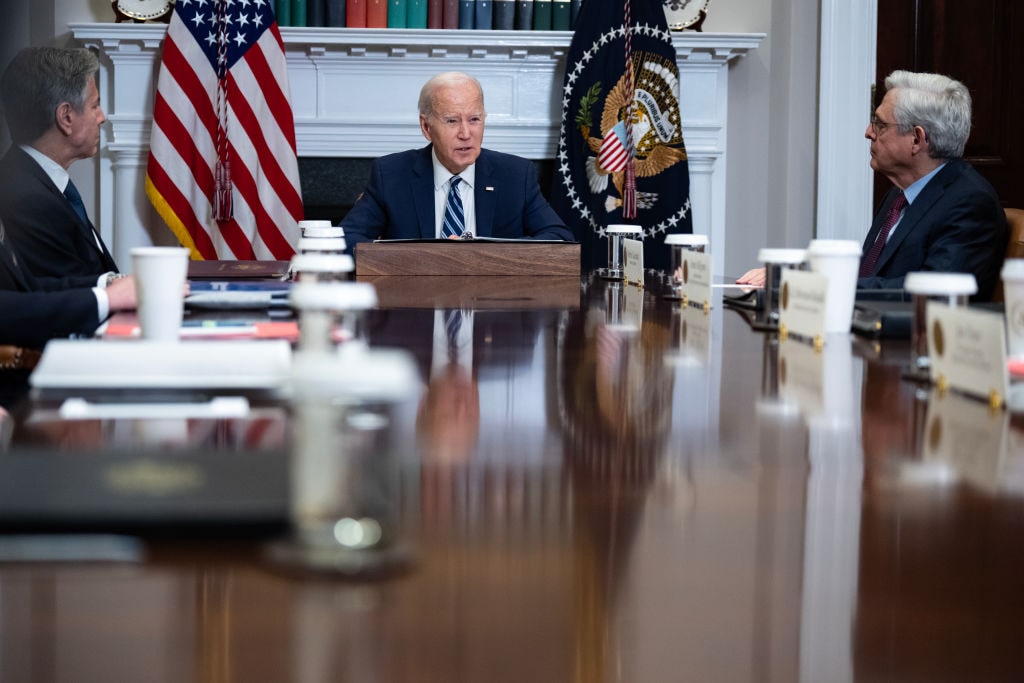Israel and Hamas have reportedly reached an agreement to pause hostilities for a four-day period in exchange for the release of 50 hostages currently held by the terrorist group. The cease-fire is expected to begin within the next 24 hours (Nov. 22-23) and see a dozen or more hostages released each day that the agreement holds. As part of the negotiations, Israel would also hand over up to 150 Palestinian prisoners. But why does Hamas really want a pause in fighting? And why are Hamas-supporting countries backing the deal?
A Cease-Fire – Not an End to War
Israeli Prime Minister Benjamin Netanyahu made it plain that the coming halt was, indeed, temporary and that his intended eradication of Hamas would continue in due course. He said:
“I would like to make it clear here again: The war continues, the war will continue until we achieve all of our goals: to eliminate Hamas, to return all our hostages, to ensure that the day after Hamas, Gaza will no longer be a threat to Israel, there will be no element in it that supports terrorism, that educates its children to terror, and who threaten the State of Israel.”
 “We are now very close, very close. We could bring some of these hostages home very soon, but I don’t want to get into the details of things, because nothing is done until it’s done,” he continued. “And if we have more to say, we will. But things are looking good at the moment.”
“We are now very close, very close. We could bring some of these hostages home very soon, but I don’t want to get into the details of things, because nothing is done until it’s done,” he continued. “And if we have more to say, we will. But things are looking good at the moment.”
Reports suggest that Hamas could potentially release another 30 hostages for an additional four-day pause. Israel’s Channel 12 noted that the hostages freed would include 30 children, eight mothers and 12 other women.
The most important question remains, however. While it is clear what Israel gets from the deal (hostages released), it is not so evident what the benefit is to Hamas and, more broadly, its nation-state supporters who helped broker the arrangement.
Just Who Is Biden Thanking?
President Joe Biden took a small victory lap for his apparent role in arranging the cease-fire. On the White House website, he released a short statement saying, “I thank Sheikh Tamim bin Hamad Al-Thani of Qatar and President Abdel-Fattah El-Sisi of Egypt for their critical leadership and partnership in reaching this deal.” He continued, taking perhaps a fair portion of the credit:
“As President, I have no higher priority than ensuring the safety of Americans held hostage around the world. That’s why—from the earliest moments of Hamas’s brutal assault—my national security team and I have worked closely with regional partners to do everything possible to secure the release of our fellow citizens … Today’s deal is a testament to the tireless diplomacy and determination of many dedicated individuals across the United States Government to bring Americans home.”

(Photo by Drew Angerer/Getty Images)
So, who are these regional partners? He mentions Qatar and Egypt specifically. Egypt has refused steadfastly to take permanent refugees from the region and is – to some degree – instrumental in what critics call the blockade of Gaza. As for Qatar, it is an open secret that three of Hamas’ top leaders live lavish lives in the capital city of Doha – Ismail Haniyeh, Moussa Abu Marzuk, and Khaled Mashal.
A report from the DC-based Foundation for Defense of Democracies explains that the emirate has justified the Hamas leaders’ presence in Qatar as part of its support for turning the terror group into “a responsible governing power.” It apparently does so by handing over between $120 million and $480 million per year to the terrorist bosses, according to the Washington think tank. “These funds benefit Hamas leaders directly through payroll and kickback schemes and indirectly through social services and government operations that help Hamas maintain political control over Gaza,” the report said.
Notably, Qatar enjoys a special status as a top-tier non-NATO ally with the US – alongside partners such as Australia, South Korea, Japan, and Israel.
And Then Another “Ally”
On Monday, November 20, Chinese Foreign Minister Wang Yi greeted a selection of Arab foreign ministers in Beijing to discuss the ongoing conflict. Dignitaries included representatives from Saudi Arabia, Egypt, Jordan, Indonesia and the Palestinian Authority. If there was any doubt as to which side of the fight the Middle Kingdom was rooting for, Minister Wang crystalized things succinctly:
“China is a good friend and brother of Arab and Islamic countries. We have always firmly safeguarded the legitimate rights and interests of Arab [and] Islamic countries and have always firmly supported the just cause of the Palestinian people.”
Reports from the Associated Press indicate that the whole affair was decidedly pro-Palestinian, focusing on criticism of Israel for its retaliatory attacks and the demand for an immediate cease-fire. The Saudi Foreign Ministry said the group had resolved to halt Israel’s “military escalation” in Gaza and “hold the Israeli occupation accountable for the blatant violations and crimes in the Gaza Strip and occupied West Bank.”
What Do Hamas and Allied Nations Actually Want?
An Israel Defense Force spokesman, Jonathan Conricus, told CNN in an interview on Tuesday:
“One would hope that – Hamas has been asking or pleading for this pause for many days now – one would hope that they would use it in order to care for civilians in the southern Gaza Strip and take care of their needs, but I think one would be naive in doing so. Hamas, they don’t care about the Palestinians, they don’t care about their humanitarian needs, and I fear that Hamas will use the pause in fighting in order to try to resupply and regroup.”
It’s an assessment that answers the question: why does Hamas want a cease-fire? A couple of factors are evident. First, Israel is intent on destroying Hamas, and if Hamas chooses to hide among civilians, then there will be civilian casualties. And second, Hamas does not care about civilian casualties. If it did, its members would not hide out in hospitals and mosques. Also, there is a certain amount of propaganda benefit to Hamas when civilians are killed by Israeli forces. In fact, one might suggest that Hamas sees such deaths as beneficial to its cause and, therefore, encourages them.
Hamas will likely use this time to further embed its fighters in the civilian population, focus on resupply, and coordinate with allies both inside and outside Gaza. Even after this round of hostages is released, Hamas still holds another 200 innocents in its grip, and that is a currency that can be spent as the organization wishes. While supposed US allies continue to back the terror group in its aims, the remaining imprisoned souls are little more than bargaining chips to pacify the international community.

